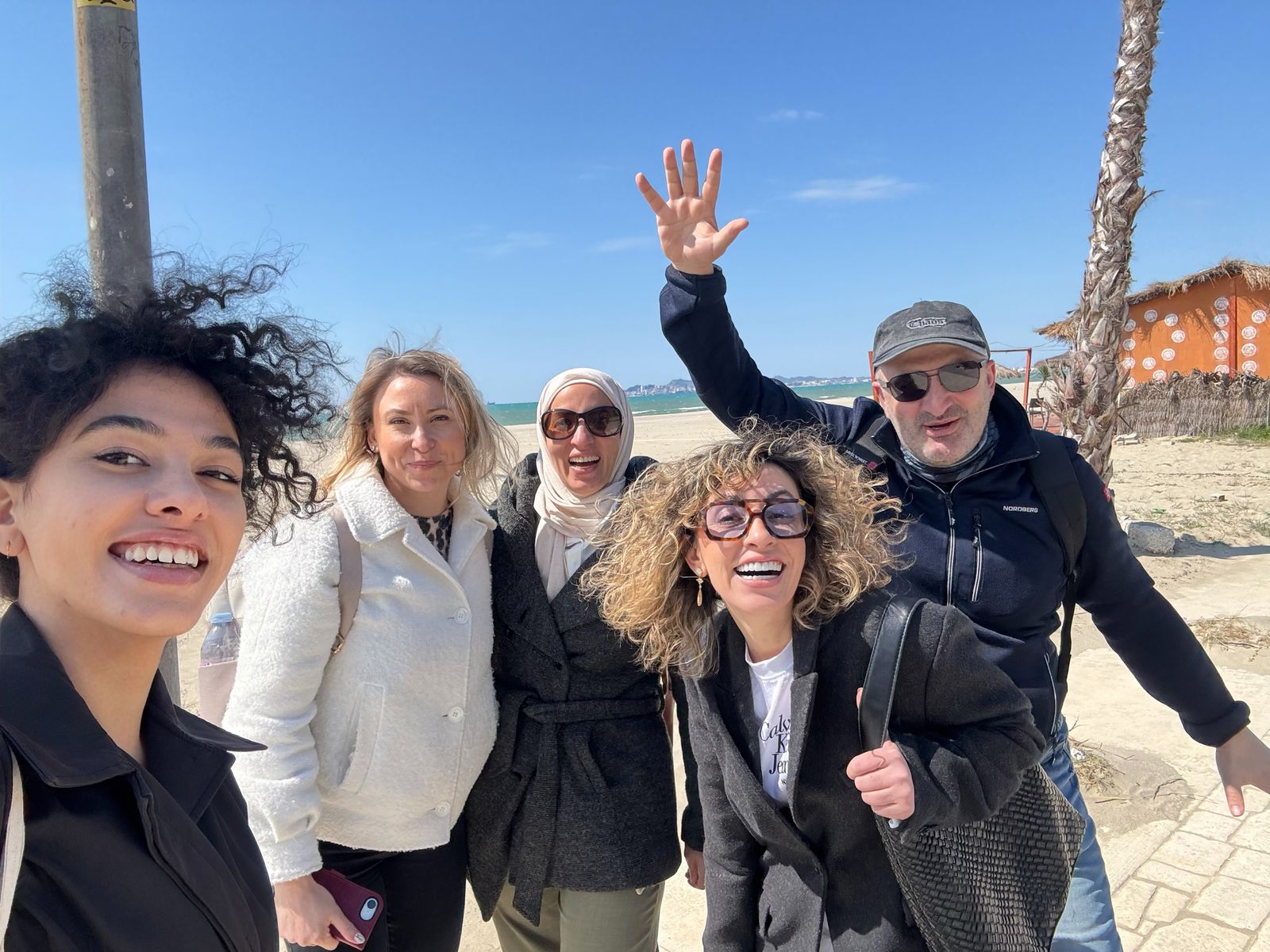Published by:
SALTO Eastern Europe and Caucasus
Story of Marina Ramblière after few weeks of her European volunteering in Moldova, and how she felt in love with Chișinău.
Struggles of Teatru Spalatorie
I’ve heard about Teatru Spalatorie long before I moved to Moldova. In a burst of curiosity, I had been looking during the previous summer for some Moldovan plays of absurdist theatre (it’s really my thing, or as we fittingly say in French, my dada), and Teatru Spalatorie was recommended with numerous occurrences. Their website, blocked on a single promotional image saying:
That moment when you’re Adibas and you’re dreaming of becoming Adidas – was already killing me with laughter.

I had learnt after that, much more than an absurdist theatre, it was above all things, a very political place where feminist and LGBTQIA+ plays were freely performed. I have also been told that the premises include a bar where alternative music could be heard and where young people gathered. Subversive and fun, it should have been without any doubt my favourite place in Chișinău.
It is only once in Moldova that the deception struck as I learnt the story. That place was actually definitely closed, and for many years now. It doesn’t mean however that Teatru Spalatorie’s adventure stopped. The troupe chose to emigrate to Germany, mostly for economical reasons, and because of exhaustion. I might have understood with time that this is very recurrent here. People leave. It’s not an unknown problem in Moldova and it seems that a lot of people around me had at least one experience of emigration or thought of it. And it feels like there is always a sword of Damocles hanging over interpersonal relationships. It is probably because I’m here for a short time myself. But the words of Nicoleta Esinencu, playwright and founder of Teatru Spalatorie, continue to question me, since she confessed that:
It can’t be all good in the country we live in and that it is better to leave on time than to drown.
| Practice your Romanian (or use google translator) to read more from Nicoleta Esinencu: “Se închide teatrul Spălătorie?“ |
Welcome to Chișinău, the city where nothing lasts
I really wonder why I have that very stubborn feeling that nothing lasts in Chișinău. It is very surprising for me to have this impression of the first capital I live in. I come from a rural area and the nearest city looks really more like a “ghost town” than Chișinău (despite not having that special spooky post-soviet vibe). I’m talking about a city where there is nothing to do, especially not cultural, and where there is a decade-long ongoing panic about the massive desertification of the city centre and about the closing, one by one, of the main stores. But my home town doesn’t have many ambitions: it’s a rural city that has been given up on by political powers, so there is not much to expect either. Therefore, what is expected from a capital?


Chișinău has all the makings of a major city, with its proliferating ads, its crowded trolleybus, its chain stores and its swarming main street. People are out in force outside, they are here, the life is visible. So why do I have this impression that everything that matters for real doesn’t last in Chișinău?
Might it be because I’m in touch with the independent culture and art’s sphere and because the bubble I’m in colours my perceptions? I really do think so because since I transposed my condition as a cultural worker from France to Moldova, my mind is constantly clouded with questions and worries. Indeed, I can’t stop wondering how independent cultural workers can last in the specific context of Chișinău. Don’t get me wrong, I know a lot of people that keep making the cultural scene of Chișinău alive (and flamboyant) but, as the story of Teatru Spalatorie has demonstrated, I think it’s really complicated to make a cultural initiative sustainable here and to be consistent with it. It requires considerable resources and cultural workers who are willing to stay no matter what, even if it means sacrificing a part of themselves, and I’m not sure Chișinău can afford this specific combination. It doesn’t look like the municipality or the state are very present either and are interested in interlocutors, outside very institutional cultural places such as Teatrul Mihai Eminescu or Muzeul Național de Artă. Even Casa Zemstvei, which have been, for the past decade, a beautiful example of success in terms of union of cultural workers and of concrete activism for the independence of culture, seems to operate under the same sword of Damocles, with its project-based functioning.
It could all come to an end within a year, we can’t know for sure – I have been told.
Casa Zemstvei seems to have found a better system than Teatru Spalatorie through funding (mostly foreign, I like to point out) that enable them to propose a free access to all their activities and that doesn’t include the pressure of maintaining a profit-making business on the side, but it still feels very precarious. It is as if the independent cultural sector could not even rely on local support, on its own town.
Gaudeamus Cinema, an idea of total destruction
Recently, I’ve also been interested in Gaudeamus Cinema’s history since it’s another example of a cultural place in Chisinau that has been closed, demolished and almost erased from the city’s history. However, I know this one is a different case, as it was a state-owned cultural place during the Soviet period and as it played an important propaganda role. It simply did not survive the economic shift and didn’t adapt to the capitalist system. But who can? Who, in the independent cultural sector, is able to do so? Aren’t we all still trying to navigate through the perpetual crises within the capitalist system? Because, if we dismantle the soviet cultural places, at the end of the day, it’s still the state-owned infrastructures that find favour with this new organization. I don’t find it abnormal or strange, although a bit elitist, but it adds to that general precarious feeling knowing this state is not stable for a long time either.


Personally, I think I was already aware of how difficult and unstable the cultural and associative world was. I’ve worked in this area in Bordeaux and I remember very well how discouraging it feels sometimes (let’s say all the time, actually) but I still perceive more hopes for the culture in that city. Maybe as French cultural workers, we’re less affected by poverty, by the one of the audience and by the general indifference it creates. I had the chance that the association I worked for was not working totally alone and I’ve been surrounded by great and dynamic initiatives on which I could count for advice and inspiration. I’ve been thinking that therefore, the stakes might be lower for us: we know that if we can’t take it any more, if we have to stop, other people will make the culture shine in our city. I don’t know if cultural workers here benefit from such peace of mind and support. Because sometimes, it really feels that everything could stop in the blink of an eye.
This is really bad to confess but I do think things are better elsewhere, that the grass is greener outside of Moldova, otherwise Teatru Spalatorie would not have to emigrate. But I also think that Moldova is worth fighting for, if you consider yourself a soldier strong enough for leading that battle. Meanwhile, everything will keep being precarious here, the culture, the life and the relationships. And after all, I know myself I won’t be staying long in Chisinau either, generating a certain inconsistency of my own.
Post scriptum


I’ve ended my volunteering few weeks ago already, but I was motivated to do European volunteering project since I was 18. I really wanted to learn about another country’s culture and I was very enthusiastic about working as a volunteer, as it’s a great way to get new skills (in my case, directly linked with my professional activities) and get more responsible. It was also important for me to do something committed, altruistic and militant, and my host association fitted with that description. Finally, I was really driven by the possibility of learning a new language as this is one of my main passions.
I’ve grown as a person by staying especially in Moldova. This is really great country but completely different from mine, so I’ve learnt a lot. I feel like I’m more educated and aware about Eastern Europe’s history and current situation, even if it’s very heterogeneous. Knowing about post-soviet countries really helped me to build nuanced opinions about the world. I’ve also learnt a lot about Romanian language and I’m very happy about that. This was important to me as a lover of Latin languages, opening a doors for my new work in Romania…
| Marina Ramblière made her European Solidarity Corps volunteering in Moldova, for Oberliht Association, an organisation that works in the field of independent culture and is particularly interested in the relationship between art, citizenship and public spaces. |



